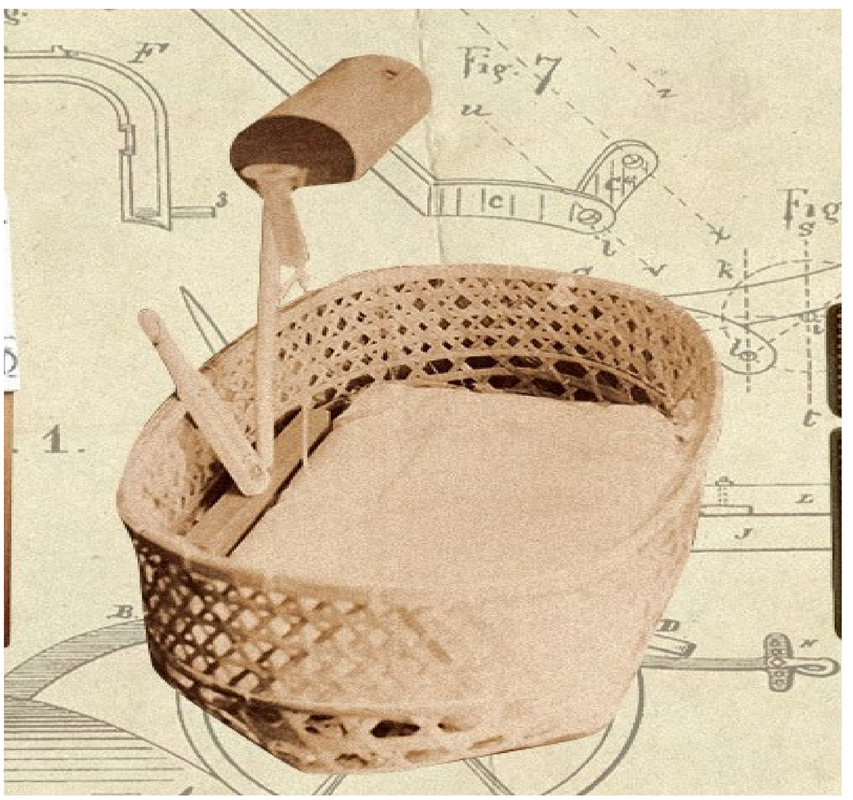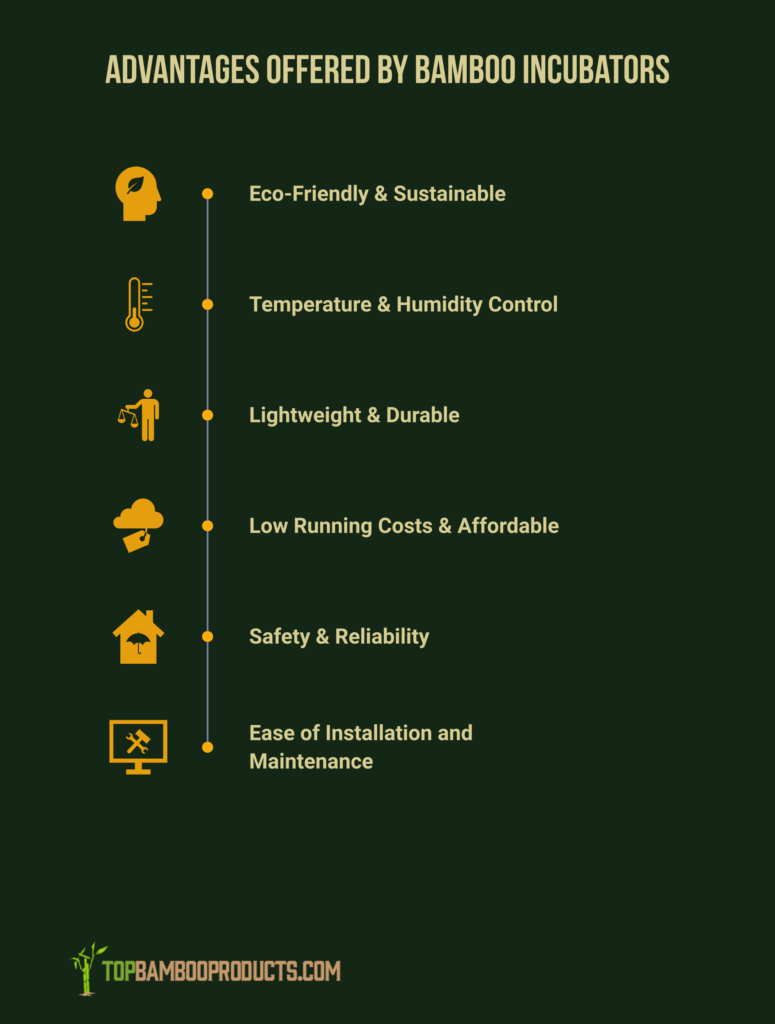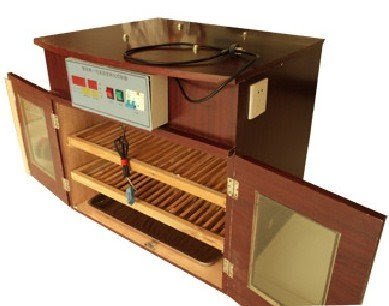Harness The Power Of Nature: All You Need To Know About Bamboo Incubators
0Shares
Have you heard about bamboo incubator? I first heard about them while researching nature’s healing power. Bamboo incubators have been gaining traction in recent times and for a good reason. These devices allow the power of nature to take charge and pave the way for sustainable and eco-friendly solutions in baby care. But what exactly are bamboo incubators, you might ask? It’s a good question.
Essentially, a bamboo incubator is a natural and biodegradable alternative to standard baby incubators. It’s made of bamboo and uses its natural properties to provide newborns with a safe, germ-free, and temperature-controlled environment. But there’s more to these incubators than meets the eye.
In this article, we’ll outline all you need to know about bamboo incubators, their benefits and more. So, sit tight, and let’s delve into the world of bamboo incubators.
What Is a Bamboo Incubator?
Bamboo incubators hatch and rear various poultry and livestock, including chickens, ducks, and quail. They are constructed using natural bamboo materials, making them environmentally friendly and affordable. Bamboo incubators operate on natural energy sources, requiring less electricity and running costs. The eggs are placed inside the bamboo incubators, and the temperature and humidity are regulated and monitored until the eggs hatch. Bamboo incubators come in various sizes, from small household sizes to large commercial units, making them suitable for small-scale and industrial farming.
The working principle of bamboo incubators is simple. The natural bamboo walls and insulation trap heat and maintain a temperature of 37.5 to 38 degrees Celsius for successful hatching. The bamboo walls also act as a moisture regulator, which creates a moist atmosphere for the eggs to hatch. The moisture content affects the eggshell’s permeability, so it is essential to maintain optimal moisture levels. Hygrometers monitor the humidity inside the incubator; you can add water to control the moisture. Thus, bamboo incubators ensure the correct environment for successful hatching.
The Concept of Bamboo Incubators

The concept of bamboo incubators gained popularity in the early 2000s. It was originally developed in India and Bangladesh as an environmentally friendly and cost-effective way to hatch poultry eggs. The concept quickly spread to other Asian countries, such as the Philippines, China, and Indonesia. Bamboo incubators have gained traction in Europe and America in recent years due to their sustainability and affordability.
The design of bamboo incubators is ingeniously simple. The basic structure consists of locally sourced, naturally grown bamboo strips woven together to create an airtight wall that maintains optimal temperatures inside the incubator while keeping drafts and external temperature fluctuations at bay. It also ensures that there is no exposure to harmful bacteria or pollutants. The bamboo walls are then sealed with a biodegradable, water-resistant coating to provide additional protection from the elements.
Furthermore, bamboo incubators can be set up in any environment without much effort due to the lightweight nature of the materials used. This makes them an ideal choice for remote areas and developing countries where resources are limited or access to electricity is unavailable.
The Benefits of Bamboo Incubators

Let’s take a closer look at the advantages offered by bamboo incubators.
✅Eco-Friendly & Sustainable
So what is a bamboo incubator made of? Bamboo incubators are made of natural, biodegradable materials that are renewable and sustainable. This eliminates the need for energy-intensive plastic incubators that generate much waste. Bamboo is also more affordable than other materials, making it an ideal choice from an environmental and economic perspective.
✅Temperature & Humidity Control
The bamboo walls of the incubator act as a natural temperature regulator, trapping heat and allowing air to circulate evenly. It keeps the temperature optimal for the successful hatching of eggs. The bamboo walls also help regulate moisture levels inside the incubator, creating an ideal environment for embryonic development. The thermal properties of bamboo also ensure consistency in the incubator’s temperature, allowing for precise and accurate readings.
✅Lightweight & Durable
Bamboo incubators are lightweight and easy to carry due to the use of natural materials. It makes them suitable for remote areas and places where electricity is not accessible. The bamboo walls are also highly durable, providing a long-lasting solution that requires minimal maintenance.
✅Low Running Costs & Affordable
Unlike electric incubators, bamboo incubators are powered by natural sources such as sunlight and thermal energy. It eliminates the need for electricity and helps reduce running costs significantly. The lightweight nature of bamboo also makes them an affordable option for both small-scale and industrial farming operations.
✅Safety & Reliability
The natural properties of bamboo provide a safer environment for hatching eggs than plastic incubators. The bamboo walls naturally resist bacteria, mites, and other harmful pollutants. This ensures that the eggs are free from contamination and can hatch safely without any health-related risks.
✅Ease of Installation and Maintenance
The lightweight nature of bamboo plants makes it easy to install and maintain. Bamboo incubators require minimal assembly, making them perfect for the DIY enthusiast. They are also easy to clean and require minimal maintenance due to their sturdy construction.
In a nutshell, bamboo incubators offer a safe, affordable, and sustainable way to hatch eggs.
The Risk Factors of Using Bamboo Incubators
Though bamboo incubators offer many advantages, some risk factors are associated with their use.
❌Contamination
Despite the natural resistance of bamboo to bacteria and pollutants, there is still a risk of contamination from external sources. Keeping the incubator as clean as possible is important by regularly cleaning its interior and exterior surfaces with antibacterial wipes or disinfectants.
❌Temperature Fluctuations
Although bamboo incubators maintain the optimal temperature for egg hatching, extreme external temperatures can cause fluctuations in the incubator’s interior. This is especially true in hot climates where temperatures can reach high levels during the day. It is crucial to monitor the incubator regularly and adjust its settings to ensure that the eggs remain at a stable temperature.
❌Fire
Bamboo is a highly combustible material prone to catching fire if exposed to extreme temperatures or open flames. It is crucial to ensure that the incubator does not come into contact with any heat sources or ignition to avoid any fire risk.
❌Mold Growth
Mold growth can occur inside bamboo incubators due to the presence of moisture. It is important to keep the incubator dry as much as possible and ensure that any spills or leaks are cleaned up quickly to prevent mold growth.
❌Physical Damage
Bamboo incubators can be damaged by physical impacts such as scratches, tears, cracks, and other signs of wear and tear. It is important to inspect the incubator regularly and take steps to repair any signs of damage to ensure its longevity.
It is essential to be aware of the risk factors associated with using them to ensure safety and successful hatching results.
Various Uses and Applications of Bamboo Incubators

Bamboo incubators have proven versatile in their use, catering to diverse needs in various settings.
☑Home Poultry Raising
Bamboo incubators offer a practical and efficient solution for households raising their own poultry. They are perfect for hatching several eggs from various birds, from chickens to quails. Their compact size and low maintenance needs make them ideal for backyard poultry raising.
☑Educational Use
In educational settings, bamboo incubators serve as a valuable teaching tool. They provide hands-on learning experiences for students, offering them insights into the incubation process and the poultry lifecycle. Their transparent panels allow for easy observation, making them an engaging resource in biology classrooms.
☑Commercial Farming
In commercial farming, bamboo incubators come into their own, especially in eco-conscious farming practices. The larger models can accommodate many eggs, making them suitable for large-scale egg-hatching operations. Their low running costs and durability also contribute to operational efficiency.
☑Wildlife Conservation
Bamboo incubators have also found a place in wildlife conservation. They are used in breeding programs for endangered species of birds, aiding in their population recovery. Their natural, toxin-free construction provides a safe environment for delicate, vulnerable eggs.
☑Pet Breeding
Bamboo incubators offer a secure and controlled environment for hatching for pet breeders, especially those dealing with exotic birds. They cater to different bird species’ specific temperature and humidity requirements, ensuring high hatch rates.
From home use to commercial farming, and educational settings to conservation efforts, bamboo incubators serve a broad spectrum of needs, making them a truly versatile solution in egg incubation.
Comparing Bamboo Incubators and Traditional Incubators
Traditional plastic incubators have been used in hospitals for decades, but technological advances have made other options available. One of the newest innovations is bamboo incubators, which have started to gain interest in recent years. Here, we will compare bamboo and traditional incubators side-by-side and dive into the future of incubators.
📌Material
Traditional incubators are made from plastic, which is relatively durable and easy to clean. On the other hand, bamboo incubators are made from eco-friendly bamboo, a sustainable and renewable resource. Bamboo is known to have antimicrobial properties, making it a great material for a sterile environment like an incubator.
📌Price Point
Medical incubators are expensive due to the cost of materials and technology used. On the other hand, bamboo incubators are reasonably priced and more affordable for hospitals or health clinics that may not have a large budget. Bamboo incubators are also lightweight and portable, making them an ideal option for remote areas with limited resources.
📌Operational Effectiveness
Traditional incubators have various features, including temperature control, oxygen delivery, and humidity management. On the other hand, bamboo incubators have similar features but may not have the same advanced technology. However, bamboo incubators offer newborns a warm and calm environment, which benefits their development and growth.
📌Energy Efficiency
Traditional incubators are powered by electricity, which can be expensive and difficult to access in remote areas. Bamboo incubators use natural energy sources such as solar and thermal power, helping reduce running costs significantly. It makes them an ideal option for hospitals that want to save money on energy bills.
Overall, bamboo incubators offer an eco-friendly, cost-effective, and efficient solution for various uses. They are perfect for hatching eggs in both home settings and commercial operations, as well as providing valuable insights into the process of incubation in educational settings.
Frequently Asked Questions
What sizes are available for bamboo incubators?
Most bamboo incubators are available in different sizes ranging from small to large. The size you choose will depend on the number of eggs you plan to hatch at any given time. Smaller incubators can hold up to 10 eggs, while larger ones can hold up to 40 or more.
How long does a bamboo incubator typically last?
Bamboo incubators are known for their durability and can last several years if properly maintained. However, the lifespan of a bamboo incubator can vary depending on factors such as usage, maintenance, and exposure to the elements.
Can bamboo incubators be customized for specific temperature and humidity requirements?
Yes, bamboo incubators can be customized to meet specific temperature and humidity requirements. Some models come with adjustable settings, while others require manual adjustments. It’s important to read the manufacturer’s instructions carefully to ensure you use the incubator correctly.
Are there any success stories or case studies showcasing the effectiveness of bamboo incubators?
Yes, many success stories and case studies showcase the effectiveness of bamboo incubators. They are widely used in Asia, especially in rural areas, where electricity is not always available. One study in India found that bamboo incubators could maintain a stable temperature and humidity level, resulting in high hatch rates.
Can bamboo incubators be used in regions with extreme weather conditions?
Bamboo incubators can withstand various weather conditions provided they are kept in a sheltered area. However, extreme weather conditions such as high temperatures or heavy rain can affect the incubator’s functionality. It’s vital to ensure that the incubator is placed in an area not exposed to direct sunlight or rain.
Where can I purchase high-quality bamboo incubators and related accessories?
You can purchase bamboo incubators from various online and offline retailers. However, it’s important to research before purchasing to ensure you get a quality product. Look for reviews and customer feedback to understand the product’s performance and durability. You should also ensure that the retailer offers a warranty and a good return policy in case of any issues.
Final Words
After thorough research and analysis, it is evident that a bamboo incubator is a revolutionary solution for incubating eggs in a sustainable and eco-friendly manner. This innovative invention integrates traditional techniques with modern technology, making it an impressive example of how we can bridge the past and the future. By providing a stable environment for eggs to hatch and grow, bamboo incubators can help improve the livelihoods of rural communities and promote biodiversity.
Furthermore, their low-cost and low-maintenance nature makes them accessible to a wide range of users, including small-scale farmers and conservationists. Ultimately, the bamboo incubator is more than just a simple tool; it symbolizes ingenuity and inspiration for sustainable development.
0Shares
